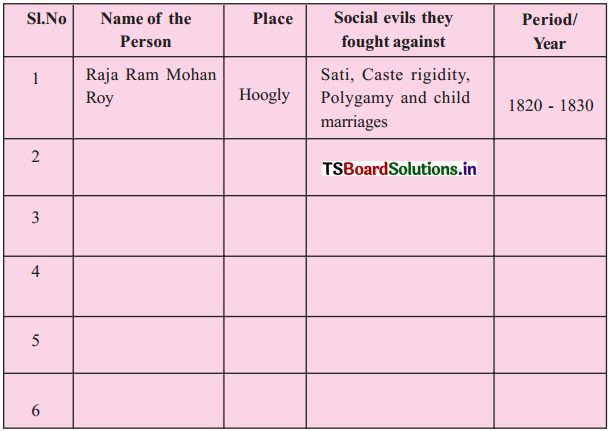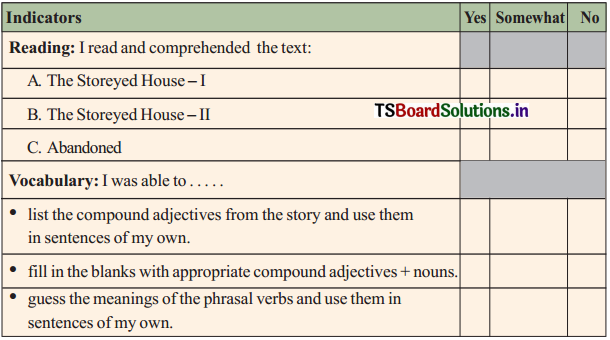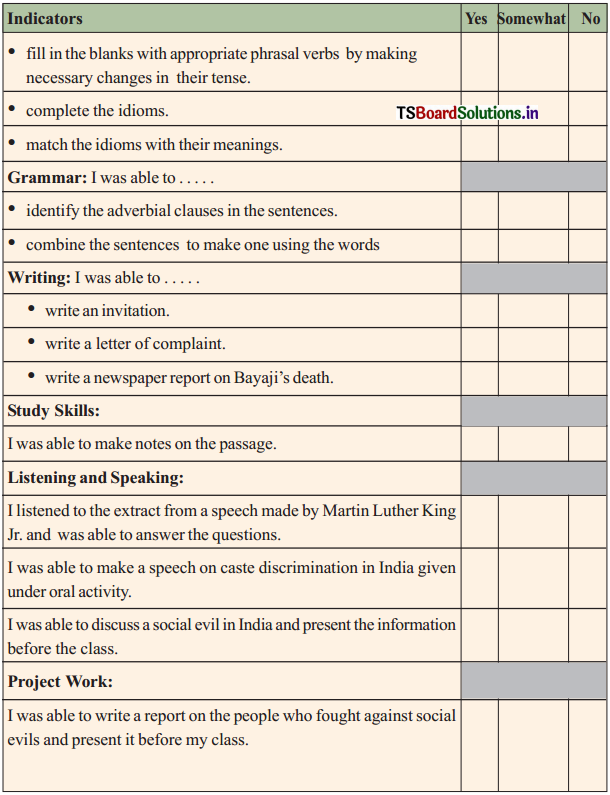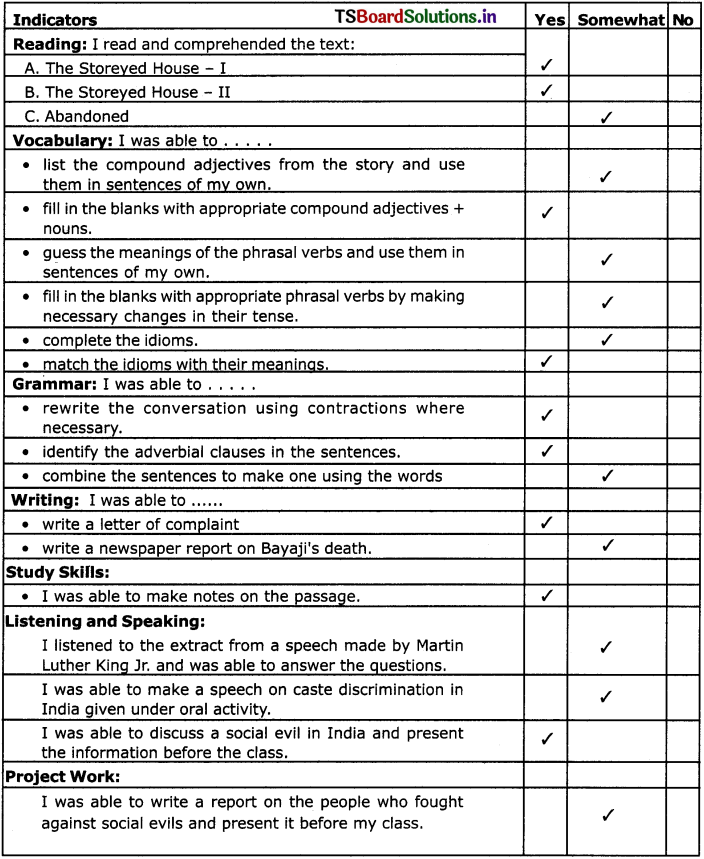Telangana SCERT TS 10th Class English Guide Pdf Unit 5C Abandoned (Poem) Textbook Questions and Answers.
TS 10th Class English Guide Unit 5C Abandoned (Poem)
Comprehension:
I. Answer the following Questions:
Question 1.
Why are the shrieks of the baby unheard?
Answer:
Because the baby is dropped in a dustbin which is far away to the public, it may be also cold night. And the baby is also covered around with a paper / cloth. Thus the shrieks of the baby are unheard.
Question 2.
“An outcast of destiny” What is meant by this expression?
Answer:
The expression mean that the baby is an outcast by the destiny. Outcasting means rejecting.
Question 3.
What are the physical features of the baby?
Answer:
The physical features of the baby are half eaten fingers, the foul smelling body, cyanosed lips, and sea-blue nose.
![]()
Question 4.
‘Easy rats’here means _______
a) easily available rats.
b) the rats that move easily.
c) the rats that are caught easily.
d) lazy rats.
Answer:
c) the rats that are caught easily.
Question 5.
Who are gnawing at the baby’s ears? Rats or a cat?
Answer:
The rats are gnawing at the baby’s ears.
Question 6.
Which of the following statements are true?
a) The cat was eating the baby,
b) The rats were eating the baby.
c) The rats were strong enough to drive away the cat.
d) The baby was dead by the time the cat came.
e) The rats left the baby to the cat.
Answer:
b) The rats were eating the baby.
d) The baby was dead by the time the cat came.
e) The rats left the baby to the cat.
![]()
Question 7.
Can you guess who abandoned the baby?
Answer:
Yes, I can guess that the illegal parents or the poor parents abandoned the baby.
Question 8.
Why do people abandon babies?
Answer:
There are so many reasons the people abandon the babies.
Here, I would like to give some of them. They are
- Some of the poor parents may abandon babies due to poverty.
- The illegal parents may abandon the babies due to the fear of society.
- Some parents may abandon the handicaped babies.
- Some parents may abandon the diseased babies.
- Some parents may abandon the female babies, (gender discrimination)
Question 9.
What leads to a bloody chaos?
Answer:
The coming of cat for the lazy rats leads to a bloody chaos. It leads to the killing of the baby.
Question 10.
Comment on the line ” The only sin of the infant — Being Born.”
Answer:
This goes out to the little babies innocent, tiny, tender souls who have been abandoned
by their families or their parents. There are so many babies found abandoned in trash cans and garbage bins on the streets in India for no fault of theirs. Few are saved but most die a painful death crying into the cold night. Doomed to death even before they could learn to live. The poet questions us whether it was their sin to be born into this world as infants.
![]()
Project Work:
Collect information about people who tought against social evil. Prepare a short note on the difficulties and oppositions they had to face to fight against the social evils. Discuss in the group the similarities in the problems they faced and the solutions they found to tackle them.

Answer:
| Name of the Social Reformer | place | Problems/Issues fought against | period |
| 1. Raja Ram Mohan Roy | Hoogly | Sati, Caste rigidity, Polygamy and child marriages | 1820 – 1830 |
| 2. Acharya Vinoba Bhave | Gagoda | Bhoodan Movement | 1895 – 1982 |
| 3. Dhondo Keshav Karve | Sherwali | Upliftment of the women and widows, womens education | 1858 – 1962 |
| 4. Kandukuri Veeresalingam | Rajahmundray | Women education, started social organisation Hilakarini | 1880 – 1910 |
| 5. Eshwar Chandra Vidya Sagar | Birsingha | Widow remarriage uplift of woman | 1820 – 1891 |
| 6. Martin Luther | German | religious reformer | 1483 – 1546 |
![]()
A short Note
Raja Ram Mohan Roy:
Raja Ram Mohan Roy was an Indian religious, social and educational reformer who challenged traditional Hindu culture and indicated the lines of progress for Indian society under British rule. He is sometimes called the father of modern India. He founded Atmiya Sabha and Brahma Samaj. He fought against ‘Sati’, and played a key role in abolition of ‘Sati’.
He fought for the rights of women. He is known as the Maker of Modern India. He was a great scholar and an independent thinker. He was born on May 22, 1772 in village Radhanagar in the district of Hoogly in Bengal. Raja Ram Mohan Roy was against idol worship and orthodox Hindu rituals. He stood firmly against all sorts of social bigotry, conservatism and superstitions. But his father was an orthodox Hindu Brahmin.
This led to differences between Raja Ram Mohan Roy and his father. Following differences, he left the house. He wandered around Himalayas and went to Tibet. After his return, he compaigned for rights of women including the right for widows for remarry and the right for women to hold property. He actively opposed Sati system and the practice of polygamy.
Difficulties and Problems faced by Social reformers and Solutions they found :
India is privileged to have a number of great souls like Raja Ram Mohan Roy, DayanandSaraswathi, Eshwar Chandra Vidya Sagar, Kandukuri Veerasalingam etc. They managed to bring revolutions by making radical changes in the society. Some of the reformers took up the challenges of breaking the jinx of prevaling caste-system.
Some of them fought against child marriages, sati, polygamy and some others fought for women education, their upliftment and widow remarriages. Their activities and thoughts guided the nation to a new beginning. All the social reformers faced many problmes in the process of reforming the society. The faced opposition from their own families as well as from outside.
Yet, they didn’t give up their efforts. With great determination and dedication, they, continued their efforts in bringing the reforms. Because of their efforts only, present society is leading a peaceful and harmonious way of life. Though many of the social reformers faced difficulties they found a solution to get rid of them and went on with their works.
![]()
Self Assessment:
How well have I understood this unit?
Read and tick ( ✓ ) in the appropriate box.


Answer:

![]()
Abandoned (Poem) Summary in English
The poem “Abandoned” is written by Dr. Suraya Nasim. Her poems are simple and easy to read and understand. The prescriptions she writes are from the brain but the poems she writes are definitely from her heart. This poem definitely derived from her heart.
In the beginning of the poem we see a little baby crying for help in a dustbin. The little baby is abandoned as an orphan to the garbage bin by unknown parents. Its tiny fingers are eaten by mosquitoes and insects. There are so many bacteria around the body of little baby which gives bad smell. The little baby has been crying for help since all the night, but nobody hears its cry and help it. In the bitter cold-night the little baby is dead.
It looks as outcast of destiny. It is clear from the context that the baby has struggled for breathing all the night. Because the baby was covered with tattered(torn) papers around the body. Due to the waste matter which lies in the dust bin along with the baby, its lips, nose and fingers are poisoned. There is a black cat at the edge of holed bin, searching for rats which are eating the baby’s body. When cat jumps upon, the rats run away. Finally the baby has left alone in dustbin as a dead one. Thus we can understand Being Born is a sin.
![]()
About the Author:
The poetry Dr. Suraya Nasim writes is straight from the heart. It has no fixed pattern. It doesn’t follow any particular rule. The poems come as a flow. Her poems are simple and easy to read and hopefully easier to understand. English was one of her favuorite subjects in school along with science. The prescriptions she writes are from the brain but the poems she writes are definitely from her heart. Her poems were nominated for the Booker Award in 2013.
Glossary:
abandoned (v) = left something or somebody for ever.;
irradiating (v) = sending rays of light upon ; light up;
shriek (n) = a short, loud high cry;
hysteria (n) = uncontrolled excitement;
eerie (adj) = causing a feeling of mystery and fear.;
destiny (n) = power believed to control events;
crap (n) = solid waste;
cyanosed (adj) = a deep greenish blue coloured;
gnawing (v) = biting steadily at something;
tattered (adj) = torn, old generally poor condition;
foul (adj) = very unpleasant.
outcast (n) = someone who is not accepted by the people they live among, or who has been forced out of their home.
labored (adj) = difficult
crap (m) = solid waste
freeze (n) = extremely cold.
filthy (adj) = very dirty.
chaos (n) = a situation in which everything is happening in a confused way.
screech (v) = to give a harsh high pitched cry;
ensue (v) = to happen afterwards or as a result, to follow;
grasp (n) = a firm hold or grip;